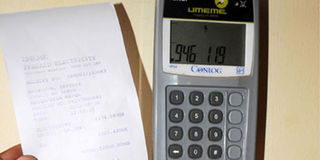We are not in position to waive electricity fee, says regulator

Not possible: The electricity regulator says unless government makes some provisions, they cannot waive electricity charges. FILE PHOTO
What you need to know:
- Presidential directive. For now, according to Ms Diana Nambi, ERA principal communications officer, the electricity sub-sector regulator is only implementing a Presidential directive of not disconnecting customers with outstanding electricity bills.
Unless advised otherwise, Electricity Regulatory Authority (ERA) cannot waive electricity fees.
ERA, which is mandated with regulating the electricity sub-sector including setting tariffs for electricity consumers, through an email response, told Daily Monitor it would be difficult to operate the electricity supply industry with a waiver on fees payable by consumers because it involves third party agreements that require resources to fund both long and short term financial obligations.
“...due to the implication on the revenue requirement and sustainability of the industry, and eventual quality of service to the consumer,” said Ms Diana Nambi, ERA principal communications officer, adding that unless the government comes in to provision for such fees or provide subsidies, a waiver is not possible at the moment.
The tariff is a composite of fees due to power generators, transmission and distribution companies.
For now, Ms Nambi said, ERA is only implementing a Presidential directive of not disconnecting customers with outstanding electricity bills.
Disconnection order beneficiaries
However, based on figures from Umeme, the primary electricity distribution company responsible for distributing 95 per cent of the generated electricity, only 30,000 customers are still on postpaid metering and will benefit from the President’s directive.
At least 1.47 million of the utility company’s customers use prepaid metering, which requires payment in advance.
ERA, Ms Nambi said, cognizant of the possible adverse impact of Covid-19, issued a directive to all distribution companies serving critical national services including referral hospitals, water services, security and telecommunication to ensure seamless continued supply of electricity.
Electricity tariff reduce by Shs0.8
Meanwhile, ERA on Monday issued the tariff schedule for the second quarter stretching April to June, indicating a marginal reduction on electricity charge for domestic consumers from Shs751.7 per unit in the past three months to Shs750.9.
Consumers will be required to pay Shs0.8 less for the power purchased during April to June.
The cost of the first 15 units for domestic consumers have been maintained at Shs250.
Commercial consumers will now pay Shs645.6 from Shs649.4 in January while medium industrial consumers will pay Shs570.9 for a unit of power from Shs575.2 in the previous quarter.
Umeme’s 502 large industrial consumers will now pay Shs361 from Shs362.4.
Whereas ERA has reduced the extra-large industrial tariff to Shs301.7 from Shs302.2, the street lighting tariff was maintained at Shs370 from last quarter.
At the beginning of the year, the regulator introduced the declining block tariff, an incentivising technique of growing local power demand.
The declining block tariff is the subsidised electricity charge to industrialists upon exceeding a set target of consumption.
For the second quarter of 2020, ERA has set the declining block tariff for large industrialists at Shs468.7 during peak time as opposed to Shs482.1 before they hit the target.
The 40 extra-large industrialists who consumed 23.8 per cent of total energy sales in 2019 will enjoy Shs106.9 reduction in tariff after hitting their electricity target between 6am to midnight.
The tariffs were determined against Shs3,711.67 exchange rate against the dollar, core consumer price index at 175.86, US producer price index at 209.6 and international fuel price at $55.49 per barrel.




